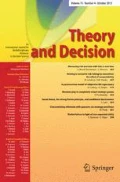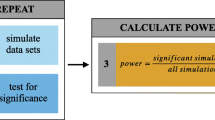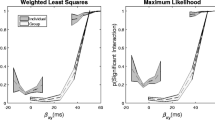Abstract
It is an important issue for economic and finance applications to determine whether individuals exhibit a behavioral bias toward pessimism in their beliefs, in a lottery or more generally in an investment opportunities framework. In this paper, we analyze the answers of a sample of 1,540 individuals to the following question “Imagine that a coin will be flipped 10 times. Each time, if heads, you win \(10\texttt{C}\!\!\!\rule[2.3pt]{.4em}{.3pt}\!\!\rule[3.3pt]{.4em}{.3pt}\). How many times do you think that you will win?” The average answer is surprisingly about 3.9 which is below the average 5, and we interpret this as a pessimistic bias. We find that women are more “pessimistic” than men, as are old people relative to young. We also analyze how our notion of pessimism is related to more general notions of pessimism previously introduced in psychology.
Similar content being viewed by others
References
Abarbanell J., Lehavy R. (2003). Biased precasts or biased earnings; The role of reported earnings, in explaining apparent bias and over/under- reaction in analysts earnings precasts. Journal of Accounting and Economics 36, 105–146
Abel A.B. (2002). An exploration of the effects of pessimism and doubt on asset returns. Journal of Economic Dynamics and Control 26, 1075–7092
Affleck-Graves J., Davis L.R., Mendenhall R.R. (1990). Forecasts of earnings per share: Possible sources of analyst superiority. Contemporary Accounting Research 6(2):501–517
Beattie J., Loomes G. (1997). The impact of incentives upon risky choice experiments. Journal of Risk and Uncertainty 14, 155–168
Calegari M., Fargher N.L. (1997) Evidence that prices do not fully reflect the implications of current earnings. Contemporary Accounting Research 14(3):397–433
Camerer C., Hogarth R. (1999). The effects of financial incentives in experiments: a Review and capital-labor-production framework. Journal of Risk and Uncertainty 19, 7–42
Darrough M.N., Russell T. (2002). A positive model of earnings forecasts: Top down versus bottom up. Journal of Business 75(1):127–152
Dreman D.N., Berry M. (1995). Analyst forecasting errors and their implications for security analysts. Financial Analysts Journal 51, 30–40
Francis J., Philbrick D. (1993). Analysts’ decisions as products of a multi-task environment. Journal of Accounting Research 31, 216–230
Fried D., Givoly D. (1982). Financial analysts’ forecasts of earnings: A better surrogate for earnings expectations. Journal of Accounting and Economics 4, 85–107
Gillette A., Stevens D., Watts S., Williams A. (1999). Price and reactions to public information releases: An experimental approach incorporating traders’ subjective beliefs. Contemporary Accounting Research 16(3):437–479
Giordani P., Söderlind P. (2006). Is there evidence of pessimism and doubt in subjective distributions? Implications for the risk premium puzzle. Journal of Economic Dynamics and Control 30, 1027–1043
Hartog J., Carbonnel A.F., Jonker N. (2002). Linking measured risk aversion to individual characteristics. Kyklos 55, 3–26
Jouini E., Napp C. (2006). Heterogeneous beliefs and asset pricing in discrete time. Journal of Economic Dynamics and Control 30, 1233–1260
Joseph R., Larrick R.P., Steele C.M., Nisbett R.E. (1996). Protecting the self from the negative consequences of risky decisions. Journal of Personality and Social Psychology 62, 26–37
Kang S., O’Brien J., Sivaramakrishnan K. (1994) Analysts’ interim earnings forecasts: Evidence on the forecasting process. Journal of Accounting Research 32, 103–112
Maines L.A., Hand J.R.M. (1996) Individuals’ perceptions and misperceptions of time series properties of quarterly earnings. The Accounting Review 71(3):317–336
McNichols M., O’Brien P.C. (1997). Self-selection and analyst coverage. Journal of Accounting Research 35, 167–199
Mehra R., Prescott E. (1985). The equity premium: A puzzle. Journal of Monetary Economics 15, 145–162
O’Brien P.C. (1988) Analysts forecasts as earnings expectations. Journal of Accounting and Economics 10, 53–88
Ritov I. (1996). Probability of regret: Anticipation of uncertainty resolution in choice. Organizational Behavior and Human Decision Processes 66, 228–236
Schipper K. (1991) Commentary on analysts’ forecasts. Accounting Horizons 5, 105–121
Stevens D.E., Williams A.W. (2003) Inefficiency in earnings forecasts: Experimental evidence of reactions to positive vs. negative information. Experimental Economics 1(7):75–92
Taylor S. (1991). Asymmetric effects of positive and negative events: The mobilization-minimization hypothesis. Psychological Bulletin 110(1):67–85
Weil P. (1989). The equity premium puzzle and the risk-free rate puzzle. Journal of Monetary Economics 24, 401–421
Wenglert L., Rosen A.S. (2000) Measuring optimism-pessimism from beliefs about future events. Personality and Individual Differences 28, 717–728
Author information
Authors and Affiliations
Corresponding author
Rights and permissions
About this article
Cite this article
Mansour, S.B., Jouini, E. & Napp, C. Is There a “Pessimistic” Bias in Individual Beliefs? Evidence from a Simple Survey. Theor Decis 61, 345–362 (2006). https://doi.org/10.1007/s11238-006-9014-2
Accepted:
Published:
Issue Date:
DOI: https://doi.org/10.1007/s11238-006-9014-2




